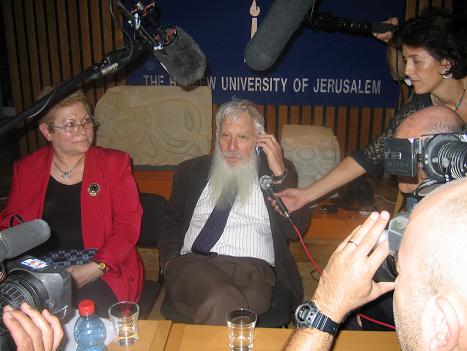However, the president of the university, Prof. Menachem Magidor says that the state of higher education in Israel continues to deteriorate, and it will be difficult to win such awards in the future

Dr. Israel Robert Uman, 75 years old, Israeli-Jewish, who holds American citizenship, but works mainly in Israel, was announced today (Monday, 10.10.05) as the winner together with his colleague Thomas C. Schelling, 84, on the Nobel Prize in Economics.
The two won the prize for increasing the understanding of conflict and cooperation issues within the framework of game theory. The two's research explains economic conflicts as part of a struggle over prices and trade, and also manages to explain why certain communities are more successful than others in managing resources.
"Nature is much more complex, and the simple game theory - where there is one interaction between two players does not hold, and therefore repeated games are important" explains Prof. Oman immediately upon receiving the news of his win.
Game theory is a mathematical field, the conclusions that emerge from it, mainly through computer simulations, can lend themselves to all areas of life, starting with the economy - for which the award was given, through understanding social issues such as helping others on the one hand and revenge on the other, and even evolutionary biology. In order to formulate the models correctly, they need to be preceded by a better understanding of reality, where you meet again and again with the same partners, and you need to make sure that both parties in these meetings come out profitable.
At the press conference convened yesterday at the Hebrew University, a total of about two hours after the announcement of the win, Oman said: "The award is for my contribution to replays. I think that this award is specifically not only for me, it was given first of all to the school of thought that we developed here in Israel, and I say specifically that we are not the only ones, a school of game theory and that we have made Israel the number one power in this profession in the world.
Replay analysis deals with situations where what I do today may also affect what the other players do in the future." Prof. Uman says. "Everyone has goals." he explains. "Everyone wants to win the game. Not everyone can win a normal game. But a normal, one-off game is not an example of what happens in the real world. In the world of economics, politics, international relations, law, where the main uses are, all parties can benefit. In the announcement accompanying the award, the members of the award committee, which is distributed, by the way, by the Central Bank of Sweden, write that Uman was the first to take the approach of analyzing endlessly repeated games, in order to solve the problem of analyzing short-lived games, which do not adequately reflect the system long term relationship. "The old games approach identified exactly what scenarios could be expected throughout long-term relationships. It was also stated in the announcement that "the theory of repeated games increases our understanding of the conditions required for cooperation: why is it more difficult to achieve when the number of participants increases, when the interaction between them is not frequent enough, when there is an increased risk of interrupting the interaction, when the time frame for cooperation is short and when it is not possible to maintain clarity about the side's actions opposite These insights help explain economic conflicts such as price wars and trade wars, as well as why some communities are more successful than others in managing a shared pool of resources. The old games approach clarifies the real reason for the existence of many institutions, starting with merchant guilds and organized crime organizations and ending with negotiations on workers' wages and international trade agreements."
Sweden's ambassador to Israel Robert Rydberg kept his word, a year ago, when Prof. Avraham Hershko and Aharon Chachanover from the Technion won the prize, he hosted them on the eve of their departure to Stockholm and said that he hopes to make this event, in which the ambassador gives the blessing to Israeli Nobel prize winners, will become a tradition. He did not even guess that a year later he would organize similar events.
